20 edible fruit, which you have not even heard
Categories: Food and Drinks | Nature | Travel
By Pictolic https://pictolic.com/article/20-edible-fruit-which-you-have-not-even-heard.htmlThese edible fruits are rarely used even where they grow, not to mention the fact that they try us. But knowing about them is still interesting — suddenly you will find yourself in a place where they grow in abundance, I'll try and will show off that eating something never tried and even never seen the majority of the population of the planet.
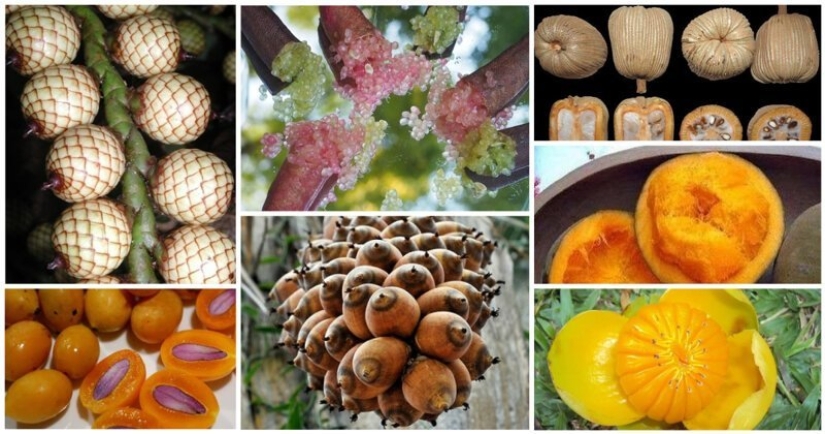

Coccoloba uvifera — sea grape
It is a seaside ornamental plant native to Florida, Mexico, Central America, Western South America and the Caribbean. Edible — the ripe, tart to sweet, purple-red fruits are edible raw and can also be made into jelly or wine. Each fruit contains one hard seed.
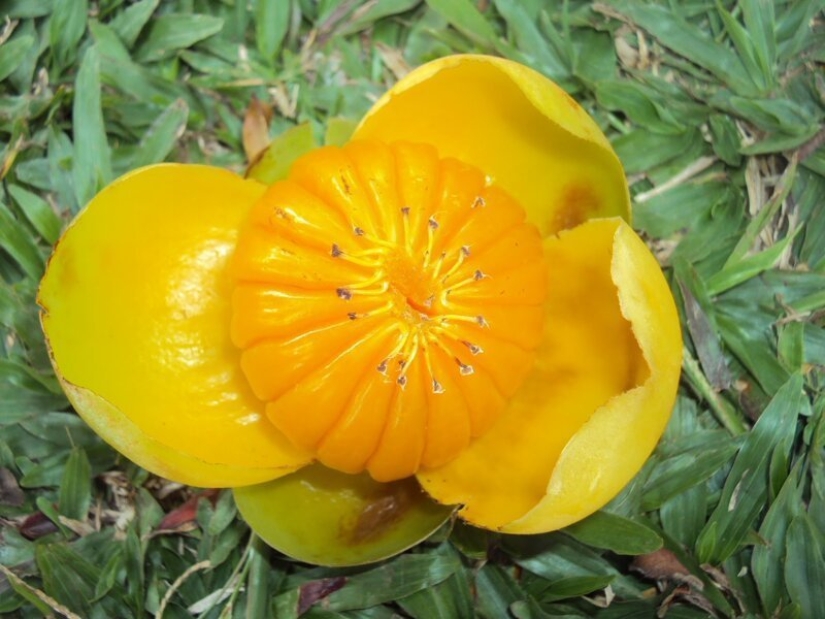
Dillenia Serrata fruit Dengan
The plant grows in the North-Eastern part of South Sulawesi, Central Sulawesi and Indonesia. The fruit looks like an orange. Fruit flavor sour and very delicious when eating with salt.
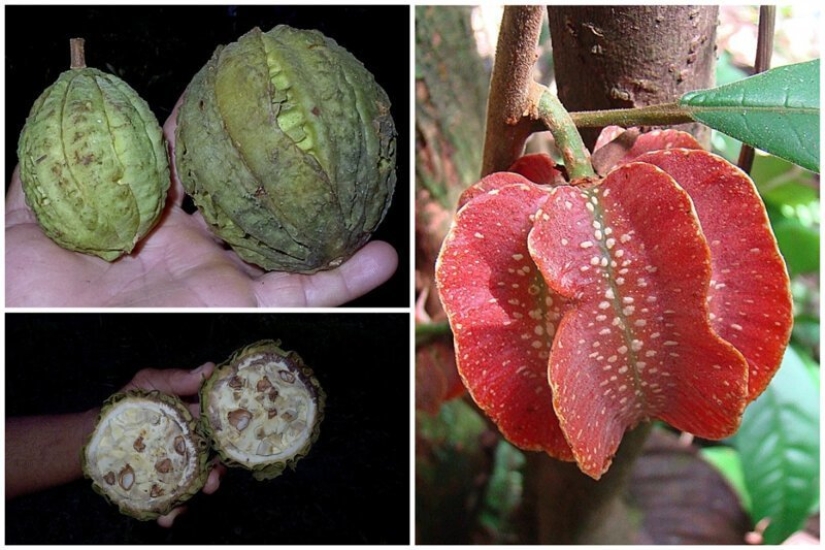
Carpotroche brasiliensis is a genus of shrubs and trees of the family Achariaceae. The flesh is white, sweet, slightly astringent
Baccaurea polyneura and Baccaurea hookeri (wiggler)
Origin: Sumatra, Kalimantan (Borneo) and Malaysia. Capsule fruit opens very unusually — with a click on the box and it "explodes" putting out the juicy red seeds or white.
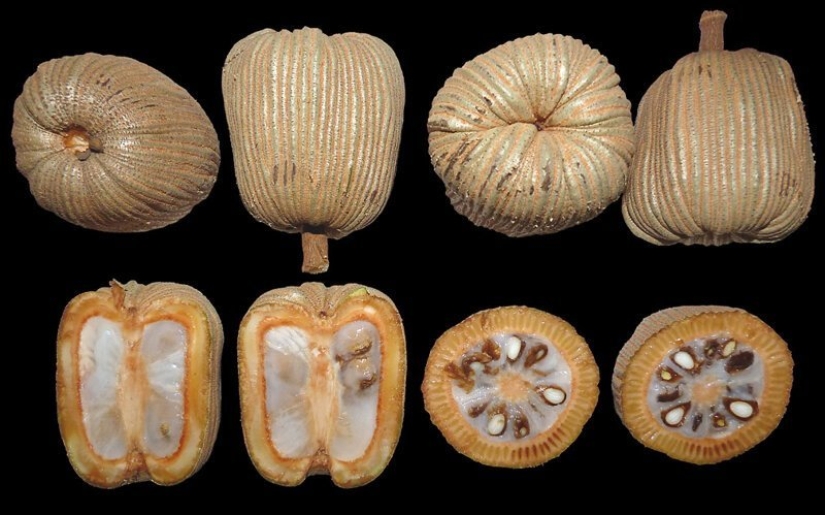
Moela-de-Mutum, Scientific name — Lacunaria jenmanii (Oliv.) Ducke
Dioecious fruit tree of medium size, in adulthood, can reach 15 meters in height. The berries are cylindrical in shape only edible pulp around the seeds has a juicy texture and sweet, but also sour taste.

Ubaia Amarela ornamental shrub with a maximum height of 3 meters. Produces a large number of delicious fruits yellowish-orange in color, slightly sweet and without acidity
It can be consumed in its natural form or as a soft drink.

Sapota do Solimões Sapota-pre-solimoes, one of the most lush plants of the Amazon, produces large fruit with a crust of dark color and yellow flesh
The fruit is solid, inside is yellow, juicy and sweet pulp.
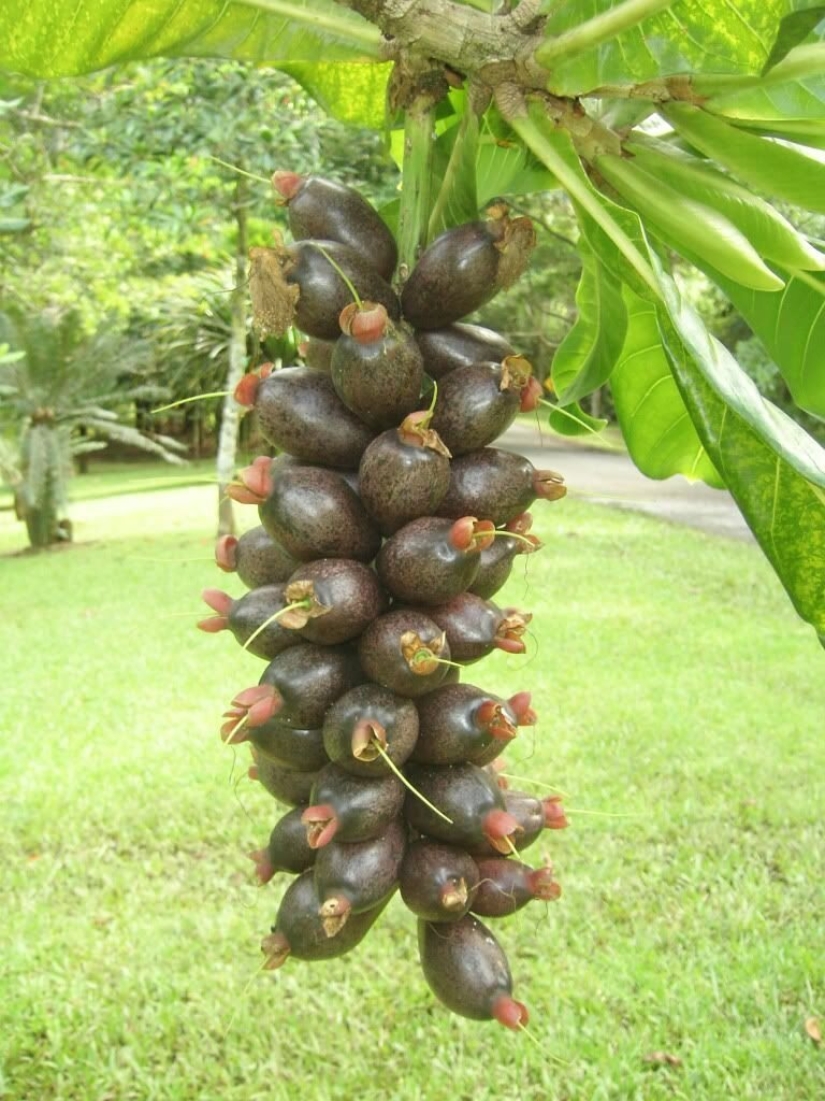
Barringtonia edulis (Barringtonia edulis)
This is a large statured's a fruit tree growing throughout Melanesia. Barringtonia edulis cultivated in villages, gardens, along trails and roads. The tree grows in the wild from the fruit which have fallen to the ground or common bats. The fruit of Barringtonia edulis is a rare fruit. Basically, it is eaten raw or cooked, good source of energy.
Let's see what his beautiful flowers. Blooms several times a year. It is called yum-Yum tree (Yum-yum Tree) is a Delicious tree, Heart tree

Of Buea bigleaf of Gandaria, or Marian plum (lat. Bouea macrophylla) — fruit tree of the family Anacardiaceae, originating from South-East Asia, a close relative of the mango
Mariana plum — evergreen tree up to 25 m high with leathery dark green lanceolate-elliptic leaves 13-45 cm long and 5-7 cm wide. The fruits are round or slightly elongated drupe with a diameter of 2-5 cm at First green, when ripe is yellow or orange. Unripe fruits contain a gummy latex. The taste of the pulp can range from sour to sweet. She has a slight turpentine smell. Inside the fruit contains one large, smooth, red-brown seed with edible kernel.
The kernel of the seeds, though edible, have a bitter taste. The fruits are edible fresh and used to prepare compotes and marinades.
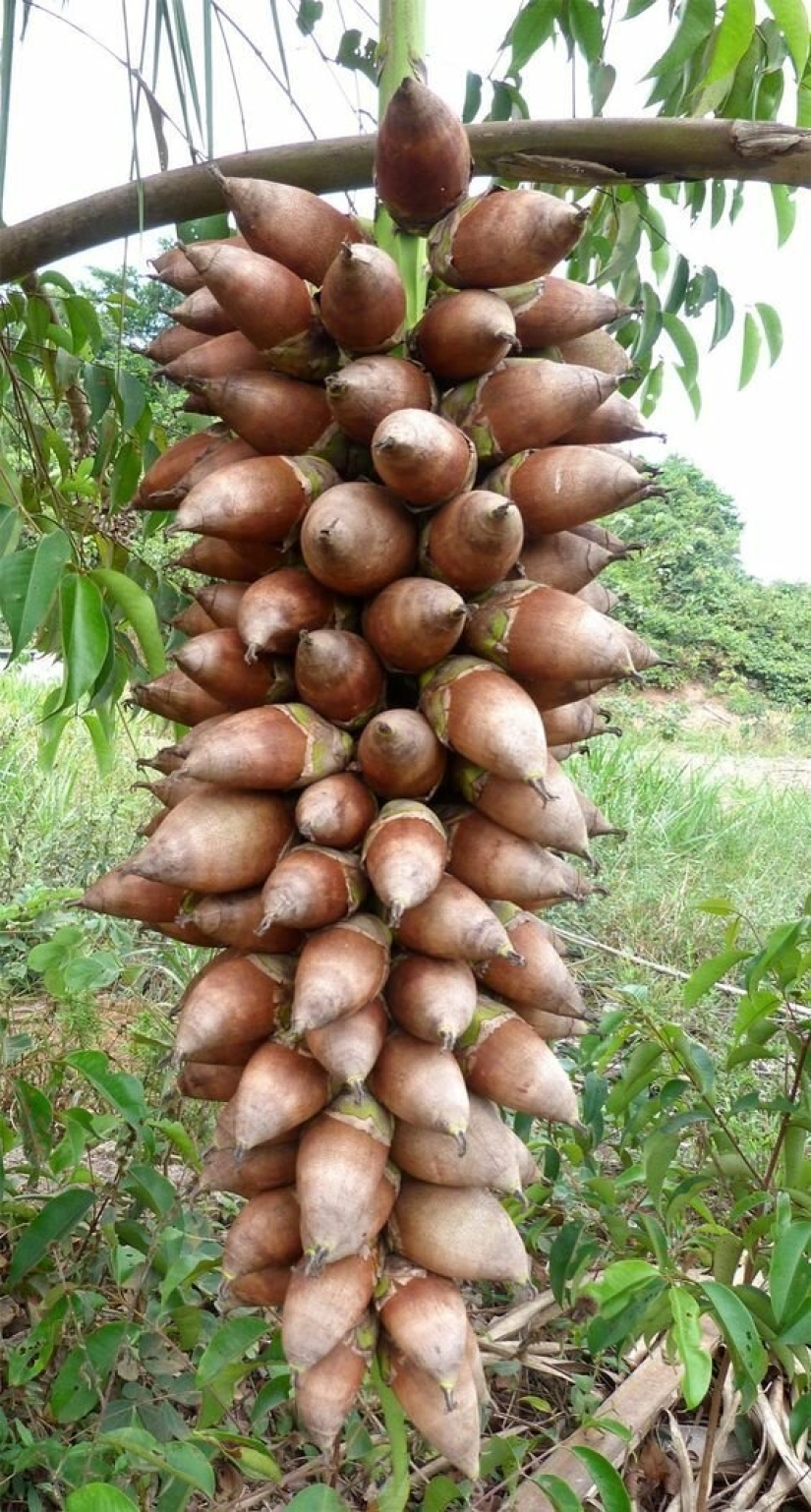
Babassu — palm, a close relative of the coconut
Almonds have a buttery, white in colour, has a dense texture and are in abundance, and can be consumed in natural form people or Pets., however, they make a very healthy oil, which is its lower in the food and cosmetic industries. The oils extracted from almonds, have a great potential for the composition of biodiesel.
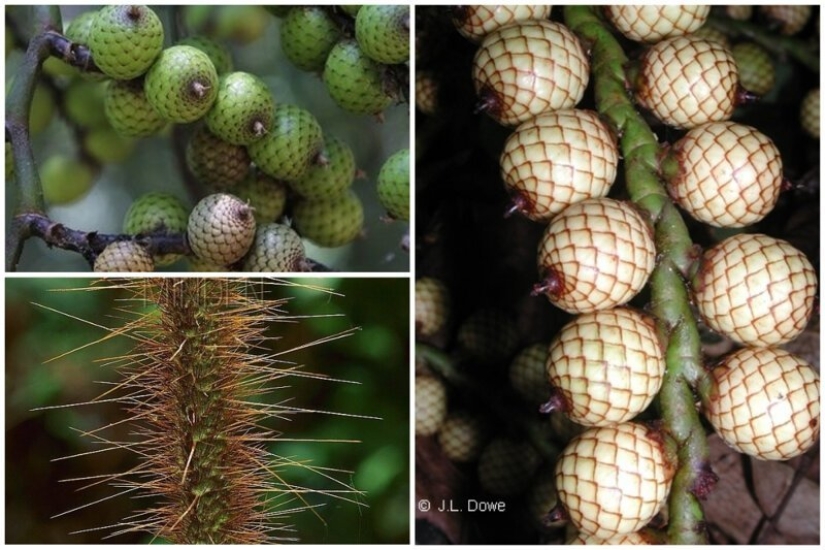
Antok (Calamus manillensis) is a vine from Australia (a kind of rattan), the trunk of which is completely studded with needles
Antok is an exotic fruit which can be found in forested areas of the jungle, but now it is grown in small plantations for commercial sale. This is one of the sweetest fruits in the world.
Kessu — the weirdest but the most delicious fruit of the island of Borneo
Casusu belongs to the family getproto (Anacardiaceae). Its scientific name — Prainea limpato. The edible part is exposed seeds orange. The seeds are soft and loosely enclosed in the fruit and can be removed. The surface of the seeds oily. The flesh has a sweet taste with a little acid.

Australian finger lime
The finger lime pulp resembles caviar or pomegranate seeds pitted. Mature fruit acidity, bright citrus nose and notes of pine needles, unripe taste bitter.
The color of the fruit surface can be different: red, green, yellowish, pink, crimson. The color of the flesh does not always coincide with the skin color. One of the saturated red varieties received the title bloody.

Nightshade chicoski, or Naranjilla — fruiting shrub of the Nightshade family
Fruit and ornamental herbaceous shrub. Reaches 1.5 — 2 meters in height. The fruit is orange, round-elliptical in diameter up to 6 cm, with easily removed white hairs. The taste is sweet and sour — a mixture of pineapple, passion fruit and strawberry.
Syzygium cumini, or jambolan, or syzygium jambolan (lat. Syzygium cumini) — a fruit tree of the family myrtaceae
Syzygium cumini is an evergreen fast-growing tree up to 30 meters with a trunk diameter of 60-90 cm and with oblong-oval leaves are 5-25 cm long and 2.5−10 cm wide. The leaves have a pronounced turpentine odor. Pink flowers with funnel-shaped calyx, 4-5 fused petals and numerous stamens.
The fruit is a glossy dark purple, almost black, drupe with a thin skin, with a diameter of 1.25−5 cm fruit Pulp is purple or white, very juicy, fragrant, astringent, sometimes bitter taste, contains one or more green or brown seeds.

Ceylon gooseberry, or Ketembilla (lat. Dovyalis hebecarpa) — fruit tree of the family Salicaceae
Ketembilla is a small deciduous tree with a height of 4.5−6 m, melkojacheistym oval gray-green leaves. Fruit spherical, with a diameter of 1.25−2.5 cm, with a thin hard velvety skin, from green (when unripe) to dark purple when ripe. Inside the fruit contains sour juicy purple red pulp. The fruits of ketembilla used primarily for jellies and jams.
The birthplace of ketembilla — Sri Lanka. It is now cultivated in South Florida, Hawaii, Puerto Rico, Cuba and the Philippines.

Santol (lat. Sandoricum koetjape) fruit tree species of the genus Sandoricum of the family Meliaceae native to Southeast Asia. The tree itself and its fruits have different names in different languages, for example, graton (กระท้อน) in Thailand
Santol — fast-growing evergreen tree height 15 to 45 m, with oblong or elliptic leaves 15-30 cm long. Fruit spherical, 4-7,5 cm in diameter. There are two varieties antolovich fruit, previously considered different species with yellowish red and velvety, containing latex. In both types, the inside contains a white transparent juicy sweet flesh with 3-5 large brown inedible seeds.
The santol fruit is edible in raw form. It is also manufactured jams, jellies, marmalades and alcoholic beverages. Santol seeds are inedible and may lead to intestinal disorders.
Between kousa Cornus small deciduous tree 8-12 m in height in the family Cornaceae. Common names: kousa, the kousa dogwood, Chinese dogwood, Korean dogwood and Japanese dogwood
This plant is native to East Asia, including Korea, China and Japan. The fruit is a globose berry 2-3 cm in diameter. It is edible, sweet and tasty addition to the decorative value of wood. Fruit sometimes used for making wine.
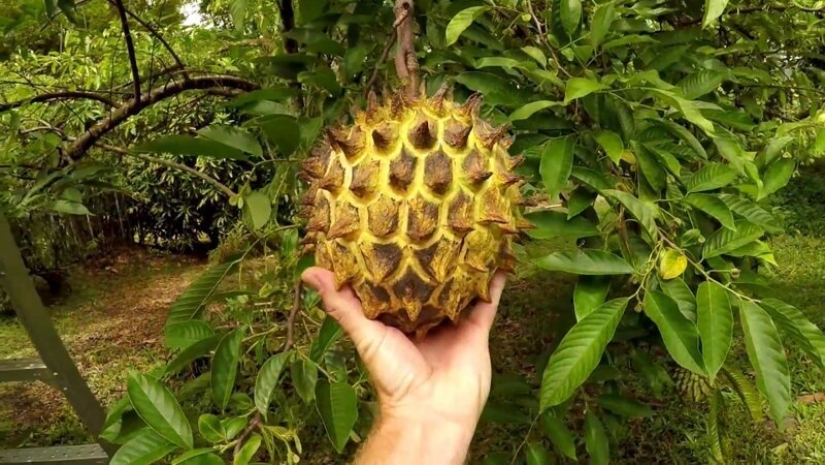
Rollinia mucosa, or Biriba (lat. Rollinia mucosa) — fruit tree of the family considered as
Rolini — a fast growing deciduous tree with a height of from 4 to 15 m. the Fruit is conical, heart-shaped, with a diameter of 15 cm Inside the fruit contains a white mucous, translucent, juicy pulp with numerous black-brown elliptical seeds. Biriba found in the wild on the vast territory from the North of Argentina, Brazil, Paraguay and Peru in the South to Guyana, Venezuela, Colombia, southern Mexico and the Antilles to the North.
Biriba fruit pulp is consumed fresh or fermented into wine.
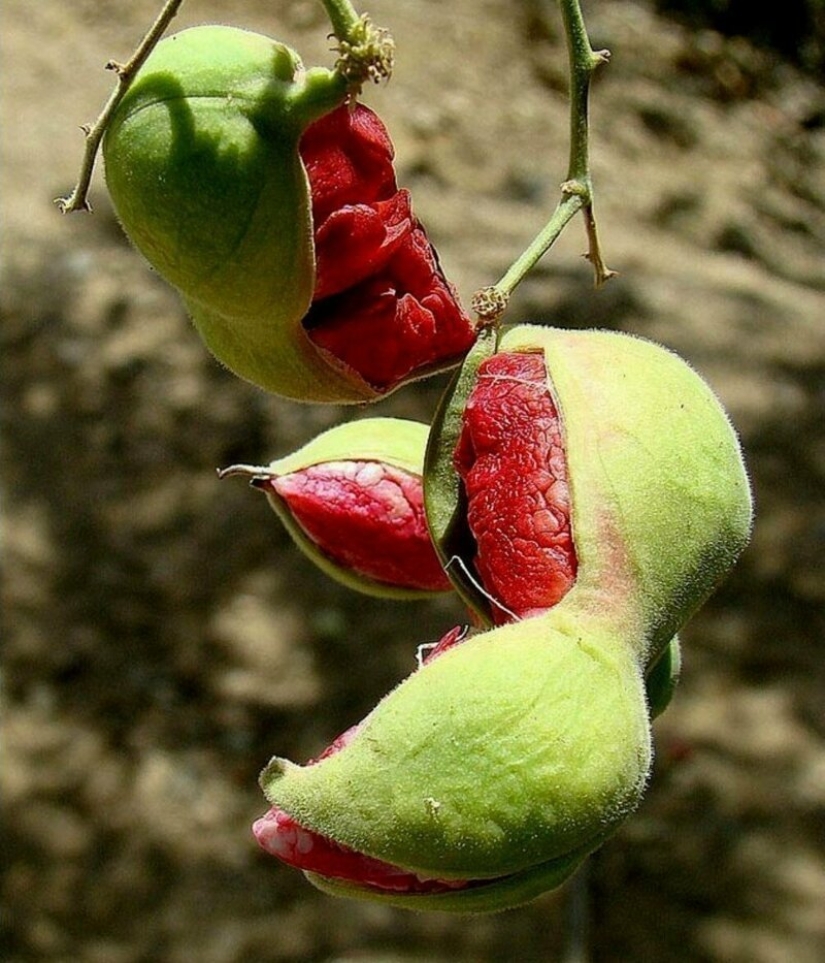
Pithecellobium sweet, or the Manila tamarind (lat. Pithecellobium dulce) is a small evergreen tree of the Legume family
Tree height 5-8 m, with oval-oblong leaves are 2-4 cm long. The fruit is a pod with edible pulp and black seeds. Seeds spread by birds eating the sweet fruits.
The pulp of the fruit, fairly sweet, can be consumed in raw form and on its basis are made soft drinks.
Keywords: Vegetables | Fruit | Plants | Fruits
Post News ArticleRecent articles

Gerard Uferas is one of the most renowned and vibrant contemporary French photographers. His talent is multifaceted, but Uferas is ...

In 1969, a healthy food restaurant opened on the Sunset Strip in Los Angeles-one of the first in the country, and possibly in the ...
Related articles

Baileys ® and Xue-Xue and Becherovka long been loved by all, but that's the price one last time "bite". But if you try it, you can ...

Fans of indoor plants know how difficult it would be to care for them. Green beauty demands constant attention and care. Dryness or ...

Citrus fruits will not surprise us — many people add lemon to tea every day, and tangerines are bought not only for the New Year. ...

Colin and Kristin Poole are an amazing creative family. Colin is a world-renowned artist, and his wife Kristin is a wonderful ...